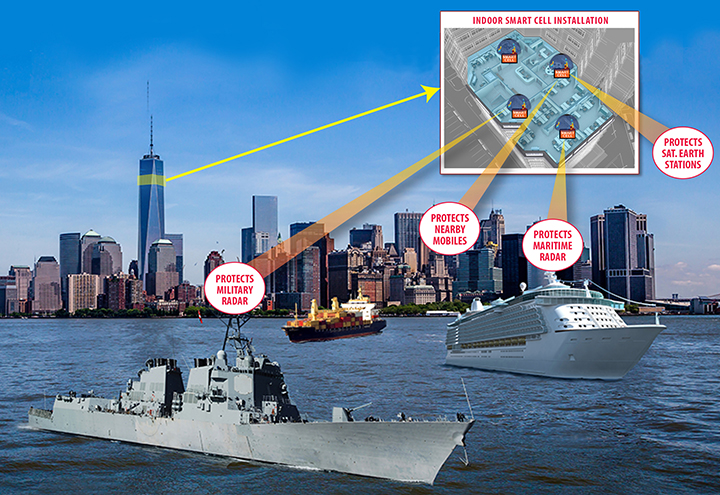(Boulder, CO) – Recognizing the public’s increasing need for spectrum, the Federal Communications Commission (FCC) recently proposed rules for public sharing of 150 MHz of previously government-exclusive spectrum. Denver-based iPosi will demonstrate its patented small cell technology that meets the FCC’s demand for “wireless broadband systems to share spectrum with military radar and other incumbent systems, while protecting important federal missions” at the upcoming international Symposium on Advanced Radio Technologies (ISART) in Boulder, CO May 12-14, 2015.
Protects Maritime Radar from Interference Up to the Shoreline
The FCC’s proposed shared spectrum rules rely on a Spectrum Access Server (SAS) to protect legacy users and enable new users to share. This band is subject to a coastal “Exclusion Zone” that eliminates 40-60% of the US population, including big cities where spectrum is needed most.
iPosi determines precise 3D GPS coordinates and the Radio Frequency (RF) loss pattern with respect to its environment and surrounding cells for each iPosi-enabled small cell. Both of these measurements are essential to managing interference.
Every building, indeed every small cell located within a building, presents a unique RF loss pattern or “profile.” iPosi measures the direction and building loss of incoming satellite signals which also reliably determines the extent of interference that can come from each cell.
These iPosi-created profiles greatly improve SAS spectrum sharing and minimize costly exclusion zones. For example, in Manhattan, a small cell on a west-facing lower floor may cause no harmful interference while an upper floor west-facing small cell might. As iPosi knows the location and maps the profile of each small cell, an iPosi-enhanced SAS can control which cells use the 3.5 GHz spectrum and which cells cannot. iPosi’s small cell technology also works for the FCC’s indoor E911 mandate as iPosi-enabled cells know their precise 3D location and the 3D location of the callers connected to those cells.
About iPosi
iPosi’s embedded small cell technology captures GPS and GNSS signals deep inside buildings for accurate time and location, and improved licensed and unlicensed spectrum efficiency without modification to mobile devices. For more information see iposi.com or email info@iposi.com.


